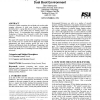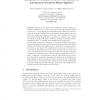12 search results - page 2 / 3 » Constrained group balancing: Why does it work |
TKDE
2012
11 years 8 months ago
2012
— We study the problem of assigning subscribers to brokers in a wide-area content-based publish/subscribe system. A good assignment should consider both subscriber interests in t...
CSCW
2004
ACM
13 years 5 months ago
2004
ACM
Small-scale classification schemes are used extensively in the coordination of cooperative work. This study investigates the creation and use of a classification scheme for handlin...
SIGUCCS
2003
ACM
13 years 11 months ago
2003
ACM
Customers of public computing sites and faculty who use the public computer classrooms to teach want diversity in computing. Inevitably, there’s a group that does not want to te...
GECCO
2007
Springer
13 years 12 months ago
2007
Springer
Imagine a group of cooperating agents attempting to allocate tasks amongst themselves without knowledge of their own capabilities. Over time, they develop a belief of their own sk...
SSD
2007
Springer
13 years 12 months ago
2007
Springer
Abstract. Modern mobile phones and PDAs are equipped with positioning capabilities (e.g., GPS). Users can access public location-based services (e.g., Google Maps) and ask spatial ...


